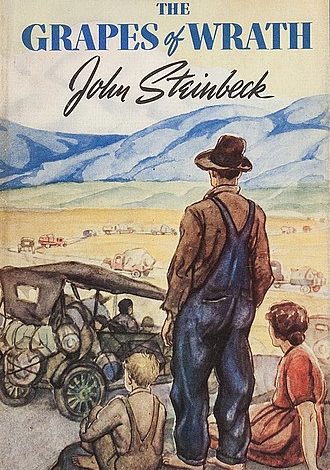The Grapes of Wrath

The Grapes of Wrath is an American realist novel written by John Steinbeck and published in 1939.[2] The book won the National Book Award[3] and Pulitzer Prize[4] for fiction, and it was cited prominently when Steinbeck was awarded the Nobel Prize in 1962.[5]
Set during the Great Depression, the novel focuses on the Joads, a poor family of tenant farmers driven from their Oklahoma home by drought, economic hardship, agricultural industry changes, and bank foreclosures forcing tenant farmers out of work. Due to their nearly hopeless situation, and in part because they are trapped in the Dust Bowl, the Joads set out for California along with thousands of other “Okies” seeking jobs, land, dignity, and a future.
The Grapes of Wrath is frequently read in American high school and college literature classes due to its historical context and enduring legacy.[6][7] A celebrated Hollywood film version, starring Henry Fonda and directed by John Ford, The narrative begins just after Tom Joad is paroled from McAlester prison, where he had been incarcerated after being convicted of homicide in self-defense. While hitchhiking to his home near Sallisaw, Oklahoma, Tom meets former preacher Jim Casy, whom he remembers from his childhood, and the two travel together. When they arrive at Tom’s childhood farm home, they find it deserted. Disconcerted and confused, Tom and Casy meet their old neighbor, Muley Graves, who tells them the family has gone to stay at Uncle John Joad’s home nearby. Graves tells them that the banks have evicted all the farmers. They have moved away, but he refuses to leave the area.
The next morning, Tom and Casy go to Uncle John’s. Tom finds his family loading their remaining possessions into a Hudson sedan converted into a truck; with their crops destroyed by the Dust Bowl, the family has defaulted on their bank loans, and their farm has been repossessed. The family sees no option but to seek work in California, which has been described in handbills as fruitful and offering high pay. The Joads put everything they have into making the journey. Although leaving Oklahoma would violate his parole, Tom decides it is worth the risk, and invites Casy to join him and his family.
Traveling west on Route 66, the Joad family finds the road crowded with other migrants. In makeshift camps, they hear many stories from others, some returning from California, and the group worries that California may not actually be as rewarding as suggested. The family dwindles on the way: Grampa dies along the road, and they bury him in a field; Granma dies close to the California state line; and both Noah (the eldest Joad son) and Connie Rivers (the husband of the pregnant Joad daughter, Rose of Sharon) leave the family. Led by Ma, the remaining members realize they must continue on, as nothing is left for them in Oklahoma.
Reaching California, they find the state oversupplied with labor; wages are low, and workers are exploited to the point of starvation. The big corporate farmers are in collusion and smaller farmers suffer from collapsing prices. All police and state law enforcement authorities are on the side of the growers. At the first migrant Hooverville camp they stop at in California, Casy knocks down a deputy sheriff who is about to shoot a fleeing worker who has alerted others that the labour recruiter travelling with the officer will not pay the wages he is promising. Weedpatch Camp, one of the clean, utility-supplied camps operated by the Resettlement Administration, a New Deal agency, offers better conditions but does not have enough resources to care for all the needy families, and it does not provide them with work or food. Nonetheless, as a Federal facility, the camp protects the migrants from harassment by local deputies.was released in 1940.
